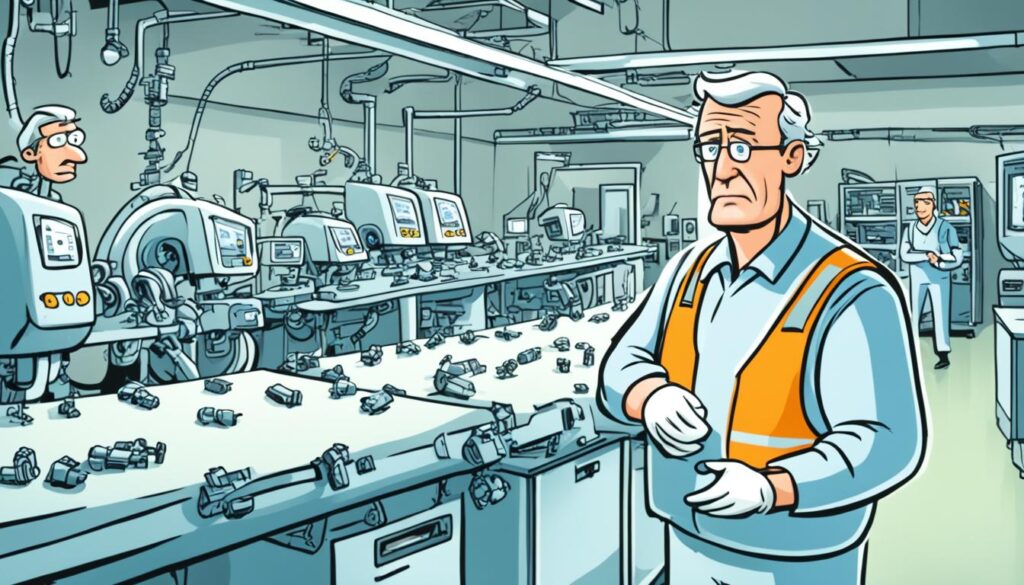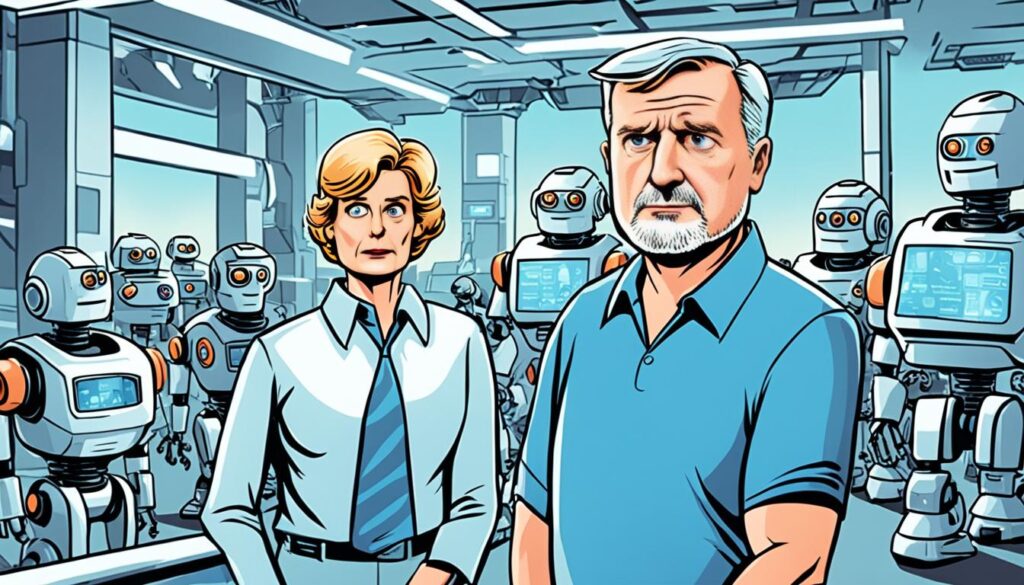Are you in your middle years and curious about how AI will change things for you? As AI grows, it’s key to see how it might affect your work and life. Let’s look at how to adjust to these changes as they roll out.
The older population around the world is getting bigger. By 2050, it will go from 703 million to 1.5 billion. AI and robots are stepping up to help take care of our seniors. In the U.S., more and more older folks are getting familiar with AI, like ChatGPT.
AI offers many benefits for our elders. It can bring ease, help them stay connected, and look out for their health. It checks their health stats regularly and spots issues early. Though, there’s worry that adopting AI might affect the jobs of people in the middle of their careers. This means learning new skills might be needed for some.
The Rapid Adoption of AI Among Middle-Aged Adults
Many people think older adults find it hard to use new tech, like artificial intelligence (AI). Yet, studies show AI adoption is growing fast among middle-aged folks. In the U.S., more than half of those 65 and over know about AI tools such as ChatGPT. This challenges the idea that only young people use and develop tech.
AI can really help middle-aged adults. It lets them stay independent and improves their lives. They can use tech like medication managers, assistive robots, and rehab tools. But, there’s a worry. The quick move to AI might mean some middle-aged people lose their jobs to robots.
It’s important to think about the economic effects for those getting older. AI could do away with jobs. On the bright side, it might open new job opportunities. Employers should focus on training and supporting middle-aged people to help them adapt well to the AI changes.
AI is catching on fast with middle-aged folks. This shows the need to make tech that works for everyone. When developers create AI tools that are easy to use and meet the specific needs of older adults, we can make a positive impact. This way, we make sure AI is a help, not a harm, to middle-aged people.
AI’s Potential to Improve Healthcare for Middle-Aged Individuals
Artificial intelligence (AI) is changing the game in healthcare, especially for middle-aged folks. It uses big data and smart algorithms to create personalized medicine, keep tabs on health from afar, and catch diseases early. This means better care and health for those in their middle years.
Personalized Medicine and Treatment Plans
AI shines in making medicine personal for middle-aged adults. It looks at electronic health records and wearable tech data to make treatment plans that fit each person. This means moving from treating everyone the same to giving each person what they truly need.
Take genetic info and lifestyle choices, for example. AI can use these to figure out which diseases a person might get. Then, it helps doctors make plans that keep these diseases at bay. This approach means fewer bad reactions to drugs and smarter use of health resources.
Remote Monitoring and Telemedicine
AI is also behind the scenes in telemedicine, changing how middle-aged people get healthcare. It lets devices keep track of health signs and activity, making it easier for doctors to watch over folks from a distance. This is a big help for those far from healthcare or with little time for regular check-ups.
Coupled with AI, telemedicine offers virtual visits. It lets patients chat with doctors from home. Smart AI tech can even help analyze these talks to give doctors real-time advice. This means care is always close by, useful for busy middle-aged adults.
Early Detection and Prevention of Age-Related Diseases
In middle age, health risks go up. But AI is on the lookout for early signs of big health issues like heart problems or cancer. It scans through loads of tests and results to find clues that a disease might be starting.
Spotting diseases early is key. It means treatments can be more effective. Plus, AI can tell who’s most at risk, helping doctors start prevention measures early. This powerful knowledge can boost the health and life quality of middle-aged adults.
The future looks bright with AI in healthcare. It’s leading us into a world with medicine made just for you, check-ups from home, and catching diseases before they grow. As AI gets better, it promises to enhance how healthcare is done for those in their middle years. With AI, middle-aged adults can stay on top of their health, make smart choices, and live their best lives even as they grow older.
The Impact of AI on Mid-Career Professionals
Artificial intelligence (AI) is moving fast and changing things for mid-career workers. It brings risks and chances too. A McKinsey study says about 375 million people, 14% of workers globally, might need to switch jobs by 2030 because of ai mid career impact. This makes it urgent for mid-career folks to adjust to the new AI world.
Middle-career workers worry about losing their jobs to job displacement ai. AI is getting better and can do some jobs instead of people. Over 50% of workers worldwide want to change jobs in the next year, showing they understand the job market is changing.
Job Displacement Risks and Opportunities
AI is a risk but also brings new job chances. It can both disrupt old jobs and create new ones. Some new job titles are AI Prompt Engineer, AI Ethics Specialist, and AI-Human Collaboration Manager. These jobs need both tech skills and soft skills, which is good news for those open to learning new things.
Reskilling and Upskilling for the AI Era
To do well with AI, mid-career workers need to learn new skills. They should become familiar with AI, good with data, and have skills that AI can work with. A survey by Accenture said 74% of those who learned new skills found it easier to get a new job. Learning and growing your skills is very important.
Learning new things all the time and looking for chances to update your skills is crucial to stand out. This could mean taking online classes, going to workshops, or getting certificates in AI. By working on their skills, mid-career workers are preparing for good opportunities in the new AI job world.
As AI keeps changing jobs, mid-career workers must change and grow too. Knowing the risks and chances AI brings, learning new skills, and keeping a learning mindset can help. With this, mid-career workers can handle changes and find good opportunities in the AI era.
AI-Driven Automation and Its Effects on Middle-Aged Workers
AI-driven automation is changing how we work fast. It offers new chances but also brings challenges, especially for middle-aged workers. They risk losing jobs to machines handling routine tasks. Older employees might find it hard to learn new roles and tech.

Research shows middle-aged workers in the EU and US are more at risk from AI’s job changes. Why? They often find it tough to keep up with modern digital tools. This is a big deal for people not working or living by themselves, as many in that group don’t use the internet. They could be hit hard by the economic shifts brought by AI.
Yet, AI can help humans, too. It lets us do work that needs creativity, problem-solving, and emotional smarts. To ensure middle-aged workers can benefit, companies should help them learn new skills and offer career advice.
Government rules also need to catch up with this tech change. They should help protect older workers from AI’s downsides. More opportunities and tech know-how can help older people stay active in the workforce longer. This will deal with a lot of the issues of an aging workforce in an automated world.
The real answer to using AI well and safely is to see the value in older workers. An open work culture that loves learning at all ages is key. This way, companies can make the most of their whole team, driving innovation and winning in the AI era.
latest developments in AI and there effect on the middle aged.
The quick changes in artificial intelligence (AI) are altering many parts of our lives. Middle-aged people are also experiencing these changes. As AI changes jobs and work flows, mid-career professionals find their lives changing. The impact of AI on middle-aged workers brings both problems and chances.
Many worry about losing their jobs to AI. As technology can now do tasks humans did before, this is a real concern for the middle-aged. They need to become a part of the AI-focused workplace. This means learning new skills to stay ahead in their careers.
At the same time, AI brings exciting advancements in health care. It means personalized treatments and early spotting of illnesses. This could really help middle-aged people stay healthy as they get older.
To do well with AI, middle-aged folks must keep learning. They should always be improving their skills and understanding AI better. Finding new job paths, like working with data or in AI ethics, can bring new chances for career growth.
Bill Gates says AI is as big a deal as the microprocessor. AI will change jobs, industries, and daily life in the next decade. Those who adjust and use AI’s benefits will do well in this new future.
Strategies for Middle-Aged Adults to Adapt to the AI Workforce
The way we work is changing fast because of artificial intelligence (AI). Middle-aged adults must work to stay ahead. They should learn continuously, understand AI, and look at new job options. Doing so will help them face challenges and find new chances in the AI-centered job world.
Embracing Lifelong Learning
Technology keeps growing, making learning a must for everyone. For middle-aged adults, keeping up means always learning and growing skills. Take online classes and get new certifications to stay current. This will boost your ability to change and keep you competitive.
Developing AI Literacy and Skills
Understanding AI basics is key to doing well in AI-focused jobs. Spend time learning about AI, like machine learning and natural language processing. This knowledge can help you find new jobs. Look for chances to learn more about AI and use it in your work.
Exploring New Career Paths and Entrepreneurship
AI is creating new jobs and chances to start your own business. Think about jobs like data science or AI ethics that fit your skills. Look for ways to add value in the AI world. Maybe start your own AI venture or consultancy. This could be a great use of your skills and knowledge.
Using these strategies can make adapting to AI easier. It can help you move to new jobs, improve your job prospects, and succeed in changing times. Remember, there are always chances to learn and change in the AI era.
The Role of AI in Enhancing Mid-Life Wellness and Longevity
In your middle years, staying healthy is key. Artificial intelligence (AI) is changing how we look at health, food, and fitness. It gives us tailored plans based on our needs. AI tools help us take charge of our health, aiming for a long, vibrant life.
AI-Powered Fitness and Nutrition Tools
AI is making a big difference in how we stay fit and eat well.
AI-backed fitness programs have upped participation by 22% for those in their middle years. These programs make plans that fit just you, using what you like to keep you going.
Also, most who use AI tools for wellness say they’re doing better with their health. These AI apps suggest what to eat, making sure your meals help your health goals.
Cognitive Health and Mental Well-Being in the AI Age
AI also matters for our brain and mood as we grow older. It offers brain exercises to keep your mind sharp and fight brain issues later on. Plus, it can spot early signs of mental health problems and help out ahead of time.
Using AI can also lessen the illness count in mid-life by 15%. The need for hospital visits also dropped by 30%, thanks to AI in wellness. As AI gets better, it can do a lot to add life to our years, making sure we enjoy our older age more.
Getting into AI tools now could really change how your middle years go. They help with fitness, food, brain health, and your mood. This could mean a longer, happier life in the AI world.
Addressing the Digital Divide Among Middle-Aged Populations
Artificial intelligence (AI) is spreading fast, but not everyone can enjoy its benefits. Middle-aged folks, especially, face a digital divide. While 60 percent of the world is online, this access is not equal. This is especially true for older people and those in poorer countries.
In the U.S., 15 percent of people over 50 lack Internet access. The main reason they don’t go online is the high cost of a fast connection.

The lack of digital access has hit hard during the COVID-19 pandemic. Around 40 percent of older Americans couldn’t get online for essential services. This issue is not just about getting online. It’s also about being part of society. In both rich and poor countries, women are less likely to have online access than men.
We need specific efforts to help middle-aged people catch up with technology. Programs teaching digital skills can make a big difference. Affordable AI technology is key in making sure everyone has a chance to benefit.
AI development needs to focus on making technology easy to use for everyone. A study found that most big tech companies are not checking how their AI affects everyone. They need to be more open and accountable. AI systems should be easy to use, no matter your technical skills.
It’s not just about being fair. Closing the technology gap means big economic opportunities. Seniors and people with disabilities together can spend a lot of money. Technology that includes everyone can unlock this market.
Looking ahead, we must consider middle-aged adults in our AI plans. We can do it by teaching them digital skills, making AI technology cheap, and designing software that is easy for everyone to use. This way, everyone can benefit from AI’s power, no matter their age or how much money they have.
Ethical Considerations and Challenges of AI for Middle-Aged Adults
AI is becoming a big part of how middle-aged adults live. It’s important to think about the ethics and challenges that come with it. Many issues like privacy, data security, algorithmic bias, and fairness need attention, especially for this age group.
The SHERPA project highlighted important ethical issues with AI and big data after talking to 250 experts. They found that keeping personal information private is a big deal with AI. It’s important to use AI responsibly with good security and clear consent from users.
Privacy and Data Security Concerns
As AI gets more common in healthcare, keeping information private is very important. Reports show many healthcare leaders are thinking of using AI more. But, they also worry about how reliable and correct AI is. It’s a big deal to make sure AI in healthcare respects patient privacy and is safe. There are calls for strict security and new rules to use AI safely.
Algorithmic Bias and Fairness
Issues with algorithmic bias might put some people, including older workers, at a disadvantage. Case studies by the SHERPA project show that AI can be unfair in different areas like employment and healthcare. It’s critical to make AI systems free from bias and include everyone. This helps avoid any unfair treatment of middle-aged adults.
Ensuring Inclusivity and Accessibility
To make AI work well for middle-aged adults, it must be easy to use and available to everyone. Different needs and digital skills should be considered when creating AI. Heather Lane talks about the need to fill the gaps in healthcare so that AI doesn’t make health differences worse. Making AI open and available to all helps everyone take part in the digital world.
Making AI ethical needs teamwork between developers, experts, and those who make the rules. Rob Laumeyer says AI in healthcare should be very reliable and accurate. By focusing on privacy, data security, and fairness, we can make sure AI helps middle-aged adults. This way, we lower the risks and problems AI might bring.
Conclusion
AI is changing the world quickly. It’s affecting people in their middle age a lot. This is happening in healthcare and jobs. It offers both new chances and some challenges.
It’s important for middle-aged people to keep learning. They should get comfortable with AI and consider new job options. They can also use AI to stay healthy and live longer, with things like personalized medicine and early warnings for diseases.
But, using AI also makes us think about some big questions and face problems. These include keeping information private, fairness in the AI’s choices, and making sure everyone can use these technologies fairly. It’s key to make sure everyone, including older people, can join in. And, AI development should welcome different kinds of people.
In this new AI-powered era, middle-aged folks have a big role to play. They need to get involved, learn, and see how AI can make their lives better. This way, they can do great in these changing times. The future with AI for middle-aged people is full of promises and changes. We all should pay attention and find ways to be part of this new age.
